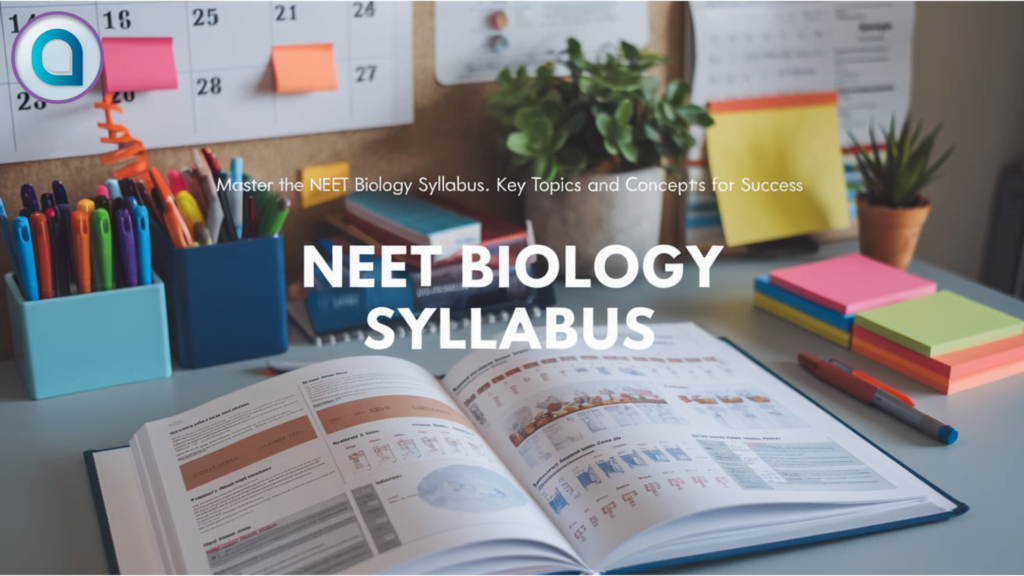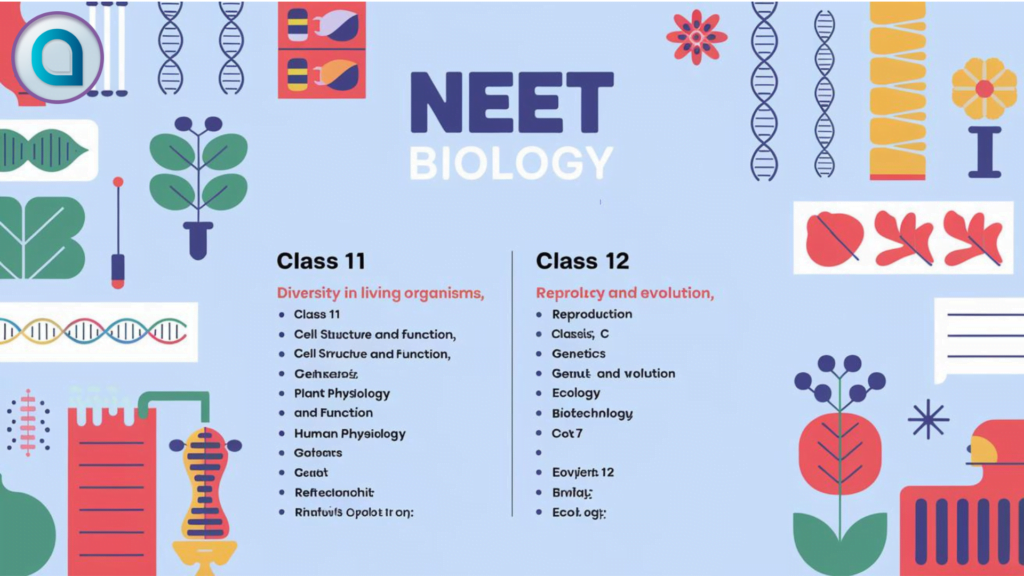
NEET Biology Syllabus 2025
The NEET (National Eligibility cum Entrance Test) Biology syllabus is an important part of the NEET exam, which is the gateway to medical and dental courses in India. Given that Biology makes up 50% of the total marks in the NEET exam, understanding and mastering this subject is vital for all NEET aspirants. This article provides an in-depth overview of the NEET Biology syllabus, its structure, key topics and tips for effective preparation.
NEET 2025 Biology Syllabus Latest Update
The NEET 2025 Biology syllabus has undergone some important updates to better align with recent educational standards. It continues to focus on core topics like Genetics, Ecology, Human Physiology and Plant Physiology but with a more integrated approach to understanding concepts. Recent changes highlight applied knowledge and understanding rather than rote memorization. Students should closely review the updated syllabus, ensuring they cover all the revised topics thoroughly.
Overview of NEET Biology Syllabus
The NEET Biology syllabus is divided into two main sections: Botany and Zoology. Each section covers a wide range of topics from both Class 11 and Class 12 NCERT textbooks. The syllabus is designed to test a student’s understanding of fundamental concepts in biology, their ability to apply these concepts and their analytical skills.
NEET Biology Syllabus: Class 11
The Class 11 Biology syllabus forms the foundation for many advanced topics covered in Class 12. Below is a detailed breakdown of the topics:
1. Diversity in Living World
- The living world, biological classification, plant kingdom, animal kingdom and the basis of classification.
- This unit introduces the vast diversity of life forms and the principles of their classification.
2. Structural Organisation in Animals and Plants
- Morphology and anatomy of flowering plants, anatomy and functions of tissues in animals and structural organization in animals.
- This unit focuses on the structural organization of plants and animals, providing a detailed understanding of their anatomy.
3. Cell Structure and Function
- Cell theory, cell structure, biomolecules and cell cycle and cell division.
- This unit deals with the fundamental unit of life, the cell and its various functions and components.
4. Plant Physiology
- Transport in plants, mineral nutrition, photosynthesis, respiration in plants and plant growth and development.
- This unit explains the physiological processes occurring in plants, which are essential for their growth and survival.
5. Human Physiology
- Digestion and absorption, breathing and exchange of gases, body fluids and circulation, excretory products and their elimination, locomotion and movement, neural control and coordination and chemical coordination and integration.
- This unit covers the various systems of the human body, explaining how they work together to maintain homeostasis.
NEET Biology Syllabus: Class 12
The Class 12 Biology syllabus builds on the concepts learned in Class 11 and introduces more complex topics. The detailed syllabus includes:
1. Reproduction
- Reproduction in organisms, sexual reproduction in flowering plants, human reproduction and reproductive health.
- This unit covers the process of reproduction in different organisms, including humans and highlights issues related to reproductive health.
2. Genetics and Evolution
- Principles of inheritance and variation, molecular basis of inheritance, evolution and the origin of life.
- This unit explores the principles of genetics, the mechanisms of inheritance and the theories of evolution.
3. Biology and Human Welfare
- Human health and diseases, strategies for enhancement in food production, microbes in human welfare and cancer biology.
- This unit focuses on the relationship between biology and human welfare, including health, disease prevention and food security.
4. Biotechnology and Its Applications
- Biotechnology – principles and processes, biotechnology and its applications and biotechnological advancements.
- This unit delves into the principles of biotechnology and its various applications in medicine, agriculture and industry.
5. Ecology and Environment
- Organisms and populations, ecosystem, biodiversity and conservation, environmental issues and sustainable development.
- This unit addresses ecological concepts, environmental issues and the importance of conservation and sustainability.

NEET Biology Syllabus 2025 Weightage
The NEET Biology syllabus for 2025 holds significant importance as it covers 50% of the total exam marks. This section is divided between two main subjects: Botany and Zoology.Understanding the distribution of marks across these topics can help students prioritize their study plan effectively, focusing more on high-weightage chapters to maximize their score. Preparing thoroughly in these areas is very important for achieving success in NEET 2025.
|
NEET Biology MCQ Topic wise Weightage |
|
|
NEET Biology Chapters |
Topic Wise Weightage |
|
Botany |
|
|
Plant Diversity |
7 |
|
Plant Anatomy |
2 |
|
Morphology of Flowering Plants |
4 |
|
Cell Structure & Function |
6 |
|
Bio-molecule |
2 |
|
Plant Physiology |
8 |
|
Plant Reproduction |
5 |
|
Genetics and Evolution |
15 |
|
Ecology and Environment |
10 |
|
Zoology |
|
|
Animal Kingdom |
3 |
|
Structural Organization in Animals |
2 |
|
Human Physiology |
13 |
|
Human Reproduction & Reproductive Health |
5 |
|
Origin & Evolution |
3 |
|
Animal husbandry |
1 |
|
Biology and Human Welfare |
1 |
|
Human Health & Diseases |
3 |
Tips for Preparing NEET Biology Syllabus
1. Switch to the NCERT Textbooks: The NEET Biology syllabus is primarily based on the NCERT textbooks for Classes 11 and 12. These books should be your primary source of study material. Make sure you read every line carefully, as many questions in NEET are directly based on NCERT content.
2. Make a Study Plan: Divide the syllabus into manageable sections and create a study plan that covers all topics. Allocate more time to difficult topics and ensure regular revision.
3. Use Diagrams and Flowcharts: Biology involves a lot of diagrams and processes. Use diagrams to understand complex concepts and create flowcharts to visualize the connections between different topics.
4. Practice MCQs Regularly: Practice as many multiple-choice questions (MCQs) as possible. This will help you get familiarized to the NEET exam pattern and improve your speed and accuracy.
5. Focus on Important Chapters: While it’s essential to cover the entire syllabus, pay special attention to high-weightage chapters. Human Physiology, Genetics and Cell Biology are some of the most important sections.
6. Take Mock Tests: Regularly take mock tests to assess your preparation level. Analyze your performance in these tests and work on your weak areas.
7. Revision is Key: Regular revision is important to retaining the vast amount of information. Schedule time for revision in your study plan and stick to it.
8. Stay Updated on Current Biology: Keep yourself updated with the latest developments in biology, as NEET sometimes includes questions on contemporary biological issues.
Conclusion
The NEET Biology syllabus is extensive and requires a thorough understanding of concepts from both Class 11 and Class 12. By focusing on key topics, sticking to the NCERT textbooks and regularly practicing MCQs, you can enhance your preparation and increase your chances of scoring well in the exam. Remember, consistent study, regular revision and taking mock tests are the keys to success in NEET Biology.
Also Read
- How to prepare for NEET 2025
- Best Books for NEET
- 10 tips to crack NEET in first attempt
- Offline vs. Online NEET Coaching: Which is better?
- 16 tips to prepare NEET at home
- NEET Biology Questions with Solutions for NEET 2025
- 10 Best NEET Coaching Center in India
- Best time to start preparing for NEET
- Chemistry NEET Preparation
- How many marks are required in NEET for MBBS ?
- Motivational Quotes for NEET Aspirants
- How many attempts for NEET?
- Best 5 App for NEET Preparation
- 10 tips to crack NEET in first attempt
- Maharashtra NEET Counselling
- Neet Coaching Center in Ahmedabad
- NEET Coaching Center in Jharkhand
- NEET Coaching Center in Faridabad
- How much time to cover syllabus in NEET Coching?
- NEET Counselling 2024
FAQs
1. What is the weightage of Biology in the NEET exam?
Answer. Biology holds 50% of the total marks in NEET, with 90 questions out of 180. It is divided into Botany and Zoology, with each section carrying equal weightage.
2. Is the NEET Biology syllabus only from NCERT books?
Answer. The NEET Biology syllabus is based on the NCERT textbooks for Classes 11 and 12. While NCERT books cover most of the syllabus, reference books can be used for additional practice and understanding.
3. Which topics are most important in the NEET Biology syllabus?
Answer. Key topics include Human Physiology, Genetics and Evolution, Plant Physiology, Cell Biology and Ecology. These areas are often heavily tested in the exam.
4. How much time should I dedicate to Biology while preparing for NEET?
Answer. Since Biology constitutes 50% of the NEET exam, it’s advisable to dedicate at least half of your study time to this subject. This includes reading, practicing MCQs and revising.
5. Can I score well in NEET Biology by only studying NCERT?
Answer. Yes, many students have scored high in NEET by focusing primarily on NCERT books. However, practicing MCQs and taking mock tests are equally important to solidify your understanding and improve your exam performance.
6. How can I effectively revise the NEET Biology syllabus?
Answer. Effective revision involves going over your notes, revisiting key diagrams and flowcharts and practicing questions from previous years’ papers. Regular revision sessions should be a part of your study plan.
7. What are some good reference books for NEET Biology?
Answer. Some recommended reference books for NEET Biology include Trueman’s Biology, Objective Biology by Dinesh and Biology by GR Bathla Publications. These books provide additional practice questions and in-depth explanations.
8. How do I manage time effectively while preparing for NEET Biology?
Answer. Create a timetable that allocates time to each topic based on its difficulty level and your comfort with it. Include breaks and ensure that you regularly review previously covered material.



